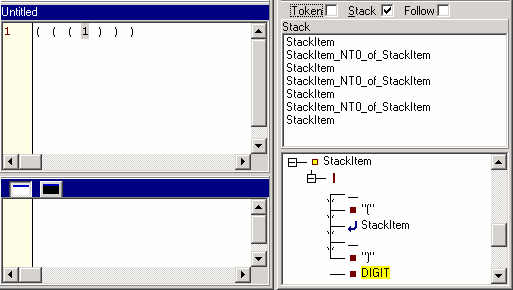Scripts > Class elements and c++ instructions > Interpreted C++ instructions > Container > vector > Stack
There isn't a general stack container class of his own in the TextTransformer interpreter. Stacks can nevertheless be realized easily.
At first there are two special stacks for text-scopes and indentations. A stack also arises from productions called recursively automatically (see below).
In other cases a vector can be used as a stack. A new value can be pushed on the stack with push_back, then the value can be accessed by back and finally it can be removed again by pop_back.
vint v;
for(int i = 1; i <= 3; i++)
v.push_back(i);
while(v.size())
{
out << v.back();
v.pop_back();
}
// result: 321
E.g. a Stack arises automatically, when the text : "( ( ( 1 ) ) )", is parsed with the following start rule:
StackItem(int xi)
{{ int i = xi + 1; }}
"("
StackItem[i]
{{ out << i << endl; }}
")"
| DIGIT
For every new instance of stack a local variables i is created: i is pushed on the stack. When the stack production is left, the variable is destoyed: i is popped from the stack.
